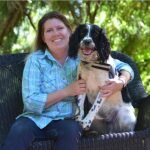A dog named Angus is a celebrity – and a saviour – in British Columbia hospitals for his ability to sniff out C-difficile in contaminated areas that need more cleaning.
Vancouver General Hospital hired Zurberg and her Springer Spaniel about four years ago and the experiment was such a success that another dog – Dodger – was put into service by Vancouver Coastal Health as well.
The most recent story I wrote is here, when a study about the dogs’ success rates at reducing hospital-acquired infections was published in the Canadian Journal of Infection Control. The dogs have such hyperacute scent detection abilities that they are finding C-diff germs lurking on surfaces, even after they’ve been disinfected (but not well enough, obviously). One of the ickiest revelations was that dogs found C.diff inside toilet paper dispensers. That happens when patients (or their visitors) with contaminated hands reach into the dispenser to pull the tissue down, leaving antibiotic-resistant bacteria on the surface.
This is presumably another way to contract COVID-19 since it has been shown to be in urine and stool. Another reminder to wash your hands!
Teresa Zurberg is the trainer/handler who pioneered the program after she got the superbug herself. With some health issues in her past, she’s been taking a break from hospital work during the COVID-19 crisis, using the time at home to develop a training manual for so many who want to duplicate her success around the world.
Scent detection dogs are becoming more common in the health field and now the University of Pennsylvania School of Veterinarian Medicine, a leader in service dog training, has just announced a pilot training program using eight labrador dogs to see if they can detect COVID-19 in urine and saliva samples. Investigators will test whether dogs can discriminate between COVID-19 positive and negative samples in a lab setting. If successful, the next step would involve testing to see if the dogs can detect COVID-19 in infected people, a goal the researchers want to get to by midsummer.
One can envision dogs being used to detect the virus in all kinds of settings, including airports, to reduce the spread in communities.

I asked Zurberg, a former Canadian Forces medic, and dog trainer/handler, what she thinks about the research. Here’s what she said:
“The COVID detection dog projects are very intriguing. I know Dr. Cynthia Otto from Penn Vet. The projects raise lots of interesting questions and challenges such as what specifically are you going to use as a training aid to train the dogs with, how do we make it safe for the handlers and the dogs, is there a scent signature difference between live virus samples and dead virus samples. (As well), viruses can morph (mutate) quickly so how do you keep the dogs up to date on what the virus is doing in terms of scent signatures, and of course how do you effectively deploy the K9 teams? Plus what liabilities are involved?
“The process is way more intricate than just having an infected person cough into a mask, training a dog to sniff what’s in there and then just holding onto the leash and following a dog around. There is a lot of science and research going into their work before they even start to train a dog. I’m interested to see where this project goes and am following it closely.”
Zurberg’s concerns about how to ensure the dogs don’t get sick during the study are valid although, to date, there are no reports of dogs dying, or even getting very ill from COVID-19. A pet dog in Hong Kong tested positive for COVID-19, as Live Science reported. Another dog, in North Carolina, also tested positive for COVID-19 after likely catching it from its owners, Time reported.

Teresa Zurberg with former BC health minister Terry Lake seen here giving a command to Angus
Here are some links to just a few of the many stories I’ve written about Zurberg and her dog detectives:
https://vancouversun.com/news/local-news/angus-the-paws-itive-hospital-asset-hits-the-road-for-more-spaniel-sniffing-infection-control-duty/
https://vancouversun.com/news/local-news/vancouver-general-hospital-to-add-second-superbug-sniffing-dog-after-anguss-success/





Recent Comments